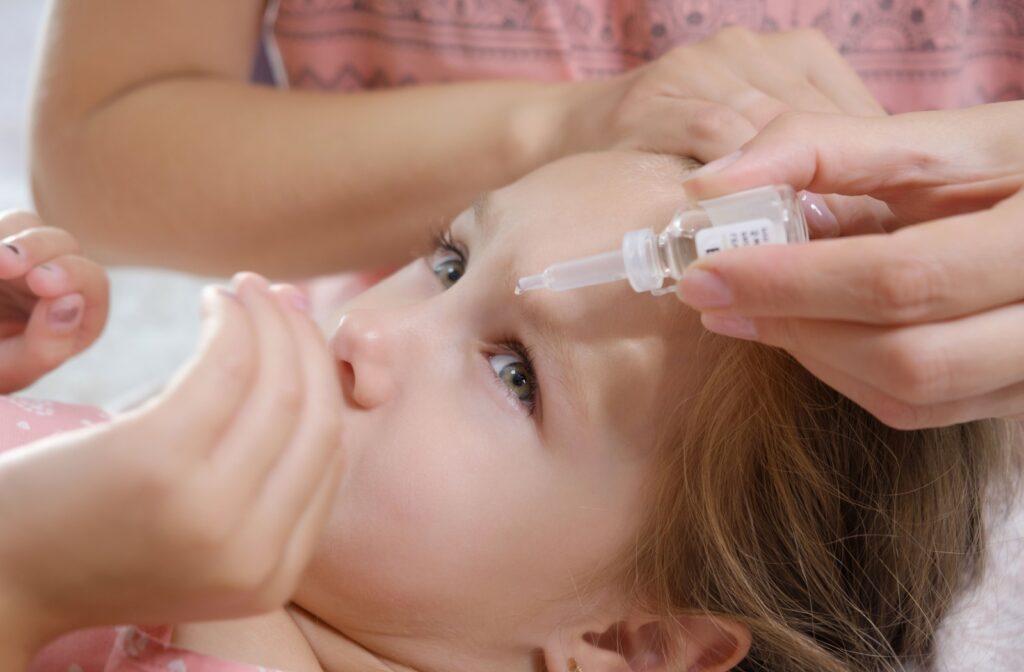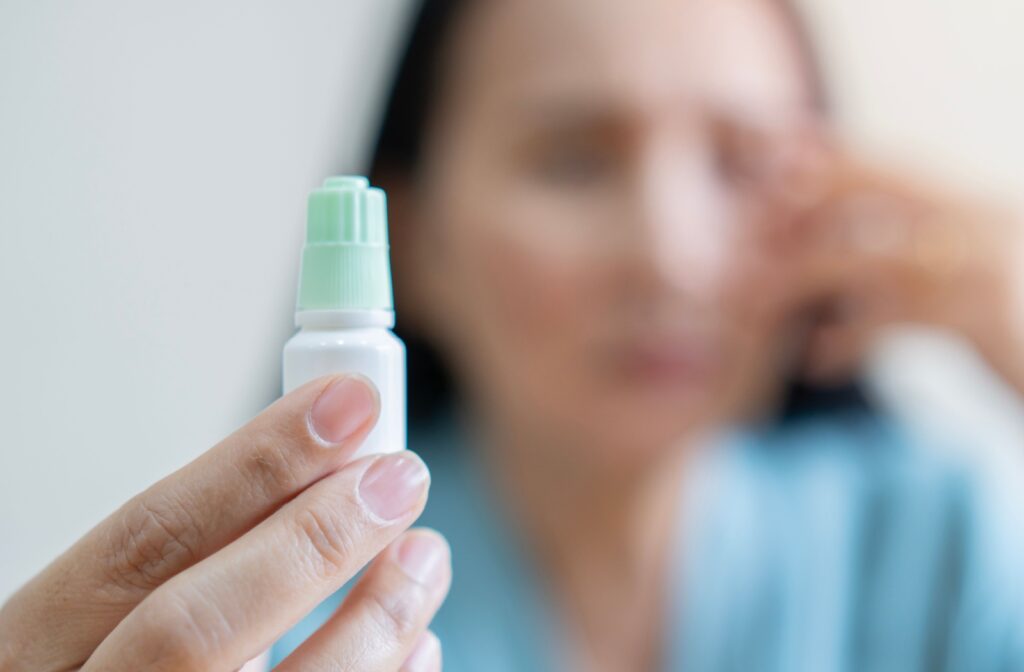You wake up with a red, itchy, and irritated eye. As you search your medicine cabinet, you find a leftover bottle of eye drops from the last time you had pink eye. But before you use these drops, it’s important to understand the role of expiration dates and how they affect your eye health.
Using expired eye drops for any condition, including pink eye, is not recommended. Expired drops can be less effective and may even cause harm to your eyes.
If you’re unsure whether or not to use your eye drops, it’s best to contact your eye doctor. They can determine the cause and appropriate treatment options for your eye irritation.
What Are Eye Drops & How Do They Work?
Eye drops are medicated solutions designed to help with symptoms, fight infections, or lubricate your eyes. Each type of drop is formulated for its own particular purpose.
Common Types of Eye Drops
There are many different kinds of eye drops, each designed to address a specific need. Some of the most common types include:
- Antibiotic Drops: Used for bacterial infections like some forms of conjunctivitis (pink eye).
- Artificial Tears: Lubricate dry, irritated eyes.
- Allergy Drops: Relieve itching & redness from allergies.
- Anti-Inflammatory Drops: Reduce swelling after an eye procedure or for certain conditions.
- Glaucoma Drops: Lower pressure inside the eye to manage the progressive stages of glaucoma.
What Makes Eye Drops Effective?
Eye drops contain active ingredients that provide the therapeutic effects you need. They also often include preservatives to prevent the growth of germs inside the bottle. The balance of these components is what allows the drops to work as intended.
The Expiration Date on Your Eye Drops
Every bottle of eye drops has an expiration date. This expiration date is the manufacturer’s way of indicating how long the product will work safely and effectively. After this date, the chemical composition of the drops can change. This means that they may no longer provide the intended results.
What Happens After Eye Drops Expire?
Over time, the active ingredients in eye drops can break down and become less powerful. The preservatives that keep the solution sterile also lose their strength. This degradation can allow bacteria to grow in the bottle, turning a helpful product into a potential risk.
Risks of Expired Eye Drops for Pink Eye
Using an expired product to treat an eye infection like pink eye comes with several risks. In fact, it may not only fail to treat your pink eye, but could also introduce new problems. Your eyes are sensitive, and using a compromised product is not a good idea.
Less Effective Treatment
If the antibiotic in your eye drops has degraded, it may not be strong enough to fight the infection. This could prolong your pink eye or even allow it to worsen. Proper treatment relies on the medication being at its full strength.
Risk of a New Infection
Once preservatives in the eye drops break down, the bottle can become a breeding ground for bacteria and fungi. Putting contaminated drops into an already infected eye can lead to a more serious condition, like a painful corneal ulcer. This introduces a new set of challenges for your eye health.
Irritation & Discomfort
The chemical makeup of eye drops can change after their expiration date. This alteration can cause stinging, redness, or further irritation to an already sensitive eye, which may then require urgent professional attention. Instead of relief, you might experience more discomfort.

What About Different Kinds of Eye Drops?
The risks associated with expired drops can vary depending on the type of medication. Some drops have a much shorter shelf life than others, especially after they have been opened. Understanding these differences can help you make safer choices.
Antibiotic & Steroid Drops
These are typically prescription drops used for more serious conditions, including bacterial pink eye. Using an expired bottle can have a significant and negative impact on your treatment outcome.
Preservative-Free vs. Preservatives
Eye drops with preservatives are designed for longer use after opening. In contrast, preservative-free drops, which are sometimes recommended as part of dry eye therapy, may come in single-use vials because they have no protection against germs. These vials should be discarded after one use, regardless of the expiration date on the box.
Pink Eye Treatment & Professional Care
Proper diagnosis and treatment are key to a quick and comfortable recovery from pink eye. Reaching for an old prescription may seem convenient, but it’s not the most effective approach.
Will Pink Eye Go Away on Its Own?
Some mild cases of viral pink eye might resolve on their own with time. However, bacterial pink eye often requires antibiotic drops to clear the infection. Without proper treatment, the infection can linger, worsen, or spread to others.
How to Handle Old Eye Drops
If you find expired eye drops in your home, the safest choice is to dispose of them properly. Do not flush them or pour them down the drain. You can seal the bottle and place it in the household trash to keep it away from children and pets.
How Your Eye Doctor in Can Help
If you have symptoms of pink eye, schedule a visit with our team at Total Vision Novato. We can determine whether it’s bacterial, viral, or allergic in origin and provide you with an effective prescription to help you feel better and see clearly again.
Instead of guessing with old medication, let us help you find the right solution for your eyes. At Total Vision Novato, we take a dedicated approach to your family’s eye health. Schedule an appointment today to get the care you need.




